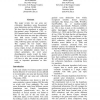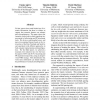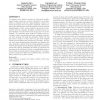138 search results - page 3 / 28 » Improving Word Sense Disambiguation Using Topic Features |
CORR
2000
Springer
13 years 4 months ago
2000
Springer
This paper revisits the one sense per collocation hypothesis using fine-grained sense distinctions and two different corpora. We show that the hypothesis is weaker for fine-graine...
ACL
2008
13 years 6 months ago
2008
To date, parsers have made limited use of semantic information, but there is evidence to suggest that semantic features can enhance parse disambiguation. This paper shows that sem...
FGCN
2008
IEEE
13 years 11 months ago
2008
IEEE
Word sense disambiguation has always been a key problem in Natural Language Processing. In the paper, we use the method of Information Gain to calculate the weight of different po...
COLING
2000
13 years 6 months ago
2000
In this paper, word sense dismnbiguation (WSD) accuracy achievable by a probabilistic classifier, using very milfimal training sets, is investigated. \Ve made the assuml)tiou that...
CIVR
2009
Springer
13 years 11 months ago
2009
Springer
To support more effective searches in large-scale weaklytagged image collections, we have developed a novel algorithm to integrate both the visual similarity contexts between the...



